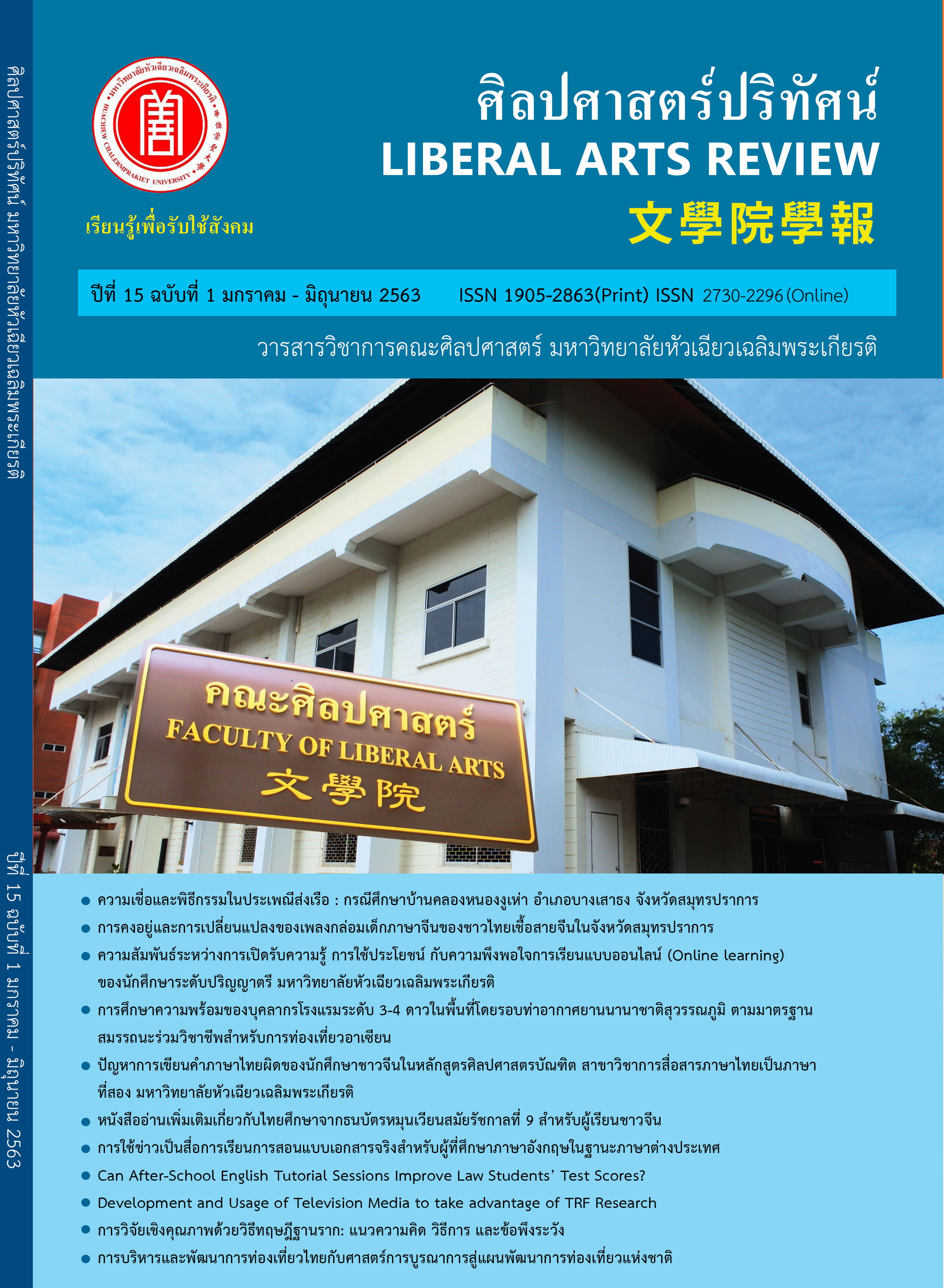Qualitative Research with Grounded Theory Procedures: Concept, Method, and Caution
Keywords:
Qualitative Research, Grounded TheoryAbstract
Grounded theory is a method to establish theories or concepts from data in qualitative research and is broader over twenty years in several research fields such as nursing, health social science, and education. The procedure of grounded theory is divided into 4 important process. For The first step, data collection is compounded by observation, interview, and documentary study. Secondly, working hypothesis is establishing concepts by the data and finding relationship between itself and empirical evidences. Whether the concepts is opposite to explicit phenomenon, researchers need to actualize next process. Thirdly, hypothesis adjustment is adapting the concepts to be much clear with phenomenon that is studying for saturation. For the final step, theoretical making is building theoretical conclusion when the researchers find that concepts or hypothesis reach into saturation by doing 3 methods such open coding, axial coding, and selective coding.
References
คมกริช นันทะโรจน์ และประสพชัย พสุนนท์. (2561). การเชื่อมโยงวิธีวิทยาการสร้างทฤษฎีฐานรากสู่การวิจัยเชิงปริมาณเพื่อการศึกษาพฤติกรรมองค์การในยุคหลังนวสมัย. Veridian E-Journal, Silpakorn University, 11(2), 317-336
งามพิศ สัตย์สงวน. (2551). การวิจัยเชิงคุณภาพทางมานุษยวิทยา. กรุงเทพมหานคร: สำนักพิมพ์แห่งจุฬาลงกรณ์มหาวิทยาลัย.
ชวิตรา ตันติมาลา (2561). การสร้างองค์ความรู้ผ่านการวิจัยวัฒนธรรมตามแนวคิดการวิจัยแบบสร้างทฤษฎีจากข้อมูลเชิงชาติพันธุ์วรรณนา. วารสารพฤติกรรมศาสตร์เพื่อการพัฒนา, 10(1): 2-24.
ชาย โพธิสิตา. (2550). ศาสตร์และศิลป์การวิจัยเชิงคุณภาพแห่งการวิจัยเชิงคุณภาพ. พิมพ์ครั้งที่ 3. กรุงเทพมหานคร: บริษัท อมรินทร์พริ้นติ้งพับลิชชิ่ง จำกัด.
ฐิติวัจน์ ทองแก้ว และ ประสพชัย พสุนนท์. (2562). การวิจิจัยเพื่อสร้างทฤษฎีฐานราก: การจัดการสมรรถนะการประกอบอาชีพเพื่อพัฒนาคุณภาพชีวิตของคนพิการในบริบทของประเทศไทย. วารสารอิเล็กทรอนิกส์การเรียนรู้ทางไกลเชิงนวัตกรรม, 9(1), 79-94.
นิศา ชูโต. (2551). การวิจัยเชิงคุณภาพ. พิมพ์ครั้งที่ 1. กรุงเทพมหานคร: พริ้นต์โพร.
บรรดล สุขปิติ. (2552). ความเข้าใจเบื้องต้นเกี่ยวกับการวิจัย. นครปฐม: หน่วยวิจัยเครือข่ายการพัฒนาครู มหาวิทยาลัยราชภัฏนครปฐม.
พัชรินทร์ สิรสุนทร และ บันดาล บัวแดง. (2558). การประยุกต์ใช้ทฤษฎีฐานรากเพื่อศึกษาผู้หนีภัยจากการสู้รบในพื้นที่พักพิงชั่วคราว ประเทศไทย. วารสารสังคมศาสตร์, 11(2), 201-222.
พิชาย รัตนดิลก ณ ภูเก็ต. (2555). บทวิจารณ์หนังสือระเบียบวิธีทฤษฎีฐานราก (Grounded Theory). วารสารพัฒนาสังคม, 14(2), 101-110.
พิทักษ์ ศิริวงศ์. (2547). ทฤษฎีฐานราก (Grounded Theory) วิธีวิทยาการวิจัยเพื่อสร้างทฤษฎีในการพัฒนาประเทศ. บรรณสาร มศก.ท., 19(1).
สนิท สมัครการ. (2522). การวิจัยเชิงคุณภาพ. ใน เอกสารจากการสัมมนาเรื่อง การวิจัยเชิงคุณภาพในสังคมศาสตร์และการศึกษา. กรุงเทพมหานคร: โรงพิมพ์และทำปกเจริญผล.
สัญญา เคณาภูมิ. (2558). การสร้างกรอบแนวคิดการวิจัยโดยใช้ทฤษฎีจากฐานราก. วารสารวิจัยและพัฒนา วไลยอลงกรณ์ในพระบรมราชูปถัมภ์, 10(3), 93-103.
สำนักงานคณะกรรมการการศึกษาแห่งชาติ. (2525). งานวิจัยเชิงคุณภาพในประเทศไทย: บทวิเคราะห์และบรรณนิทัศน์. พระนคร: เซนเตอร์พับลิลิคเคชั่น.
สุชาติ ประเสริฐรัฐสินธ์. (2554). วิธีวิทยาการวิจัยเชิงคุณภาพยุคใหม่. กรุงเทพมหานคร: สามลดา.
สุพรรณี ไชยอำพร. (2531). การวิจัยเชิงคุณภาพจากทฤษฎีสู่ภาคปฏิบัติ: ประสบการณ์จากห้วยแห้ง. วารสารพัฒนบริหารศาสตร์, 28(1), 103-122.
สุภางค์ จันทวานิช. (2522). วิธีการวิจัยเชิงคุณภาพ ใน เอกสารจากการสัมมนาเรื่อง การวิจัยเชิงคุณภาพในสังคมศาสตร์และการศึกษา. กรุงเทพมหานคร: โรงพิมพ์และทำปกเจริญผล.
สุภางค์ จันทวานิช. (2561). วิธีการวิจัยเชิงคุณภาพ. กรุงเทพมหานคร: สำนักพิมพ์แห่งจุฬาลงกรณ์มหาวิทยาลัย.
Charmaz, K. (2000). Grounded Theory: Objectivist and Constructivist Method. In Denzin, N.K. and Lincoln, Y.S. (Eds.). Handbook of Qualitative Research. Second Edition” Thousand Oaks, CA: Sage.
Creswell, J.W. (1998). Qualitative Inquiry and Research Design: Choosing Among Five Traditions. Thousand Oaks, CA: Sage.
Little, D. (1991). Varieties for Social Explanation: An Introduction to Philosophy of Social Science. Colorado: Westview.
Pullias, E.V. (1978). The Higher Learning: Teaching and Research in College and University. Educational Research Quarterly, 3(3): 5-7.
Schwandt, D. (2001). Interpreting Qualitative Data: Methods for Analyzing Talk, Text and Interaction. London: Sage.
Strauss, A.L. & Corbin, J. (1990). Basic of Qualitative Research: Grounded Theory Procedures and Techniques. Newbury Park, CA: Sage.
Strauss, A.L. & Corbin, J. (1990). Basic of Qualitative Research: Grounded Theory Procedures and Techniques, 2nd Editions. Newbury Park, CA: Sage.
Thomas, I. W. & Znaniccki, F. (1927). The Polish Peasant in Europe and America. 2nd edition. New York: Alfred A. Knopf.
Downloads
Published
How to Cite
Issue
Section
License
บทความที่ได้รับการตีพิมพ์เป็นลิขสิทธิ์ของวารสารศิลปศาสตร์วิชาการและวิจัย
ข้อความที่ปรากฏในบทความแต่ละเรื่องในวารสารวิชาการเล่มนี้เป็นความคิดเห็นส่วนตัวของผู้เขียนแต่ละท่านไม่เกี่ยวข้องกับมหาวิทยาลัยหัวเฉียวเฉลิมพระเกียรติ และคณาจารย์ท่านอื่นๆ ในมหาวิทยาลัยฯ แต่อย่างใด ความรับผิดชอบองค์ประกอบทั้งหมดของบทความแต่ละเรื่องเป็นของผู้เขียนแต่ละท่าน หากมีความผิดพลาดใดๆ ผู้เขียนแต่ละท่านจะรับผิดชอบบทความของตนเองแต่ผู้เดียว




